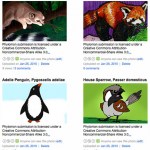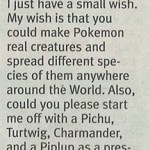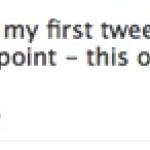The Website Building
This is straight from the main page:
Things are humming along! We have over 100 images submitted, 30 or so queued up for card production, and over 40 folks signed up on the forum (in fact, one set of rules is arguably close to beta testing). The response has been simply wonderful, and these numbers don't even the include the numerous comments and chats culled from coffee meetings to blog posts to tweets. To us, this outpouring is something else, especially in light of the fact that we've technically only seeded an "idea" out there!
The website, itself, is being prodded, poked and tweaked as…
Well, now it can be used for the Phylomon project. You know, the one where we're hoping we can guide an open source project into a free and massive card collecting game that is fun and even perchance (oh no, here it comes...) educational.
Now that we're at a stage where we're confident that the mechanics of obtaining images is sound (check out the submissions pool here, and the few from this pool that we've already lined up for beta testing as shown below), we're ready to move onto other crucial components of the project.
Namely gameplay and content on the card.
In many ways, we think these…
If so, you should join this facebook group. Or to discuss further, please go to http://friendfeed.com/phylomon.
Here's part of what started this group and project: a friend of mine passed on this "letter to Santa:"
It quite nicely demonstrates an issue with advocates of biodiversity - that is, what can we do to get kids engaged with the wonderful creatures that are all around them? They obviously have the ability and the passion to care about such things, but it appears misplaced - they'll spend a ton of resources and time tracking down fictional things, when they could easily do the same…
Well, it's been about three weeks since I signed up for a personal account on twitter (you can follow me here if you're interested - my handle is @dnghub), and threw out my first "tweet."
Since then, I've found myself fully immersed in the web tool, and feel like I can say a few intelligent things about it, especially if you're reading this as someone who is resisting signing on, or someone who just wants to know a little more about it.
It might help if I first start off with a bit of context.
For instance, my lab sort of already has a twitter account, listed under @sciencescout. Here…
I can't believe Dave didn't cross post this. Someone once gave him a hard time for linking to and across the SCQ and here, but, come on, Dave, this should've made the journey. From The Filter, here is a rundown of Science on the Simpsons, which, true, could be next year's TV on the Radio if given proper support from Pitchfork.
The 13 pics are matched to text at Filter, and I'll let you find them there.
But there are more that could fit into the collage, more Science on the Simpsons. These three links -- Nature, Seed, SNPP -- can help get you on your way to more. For example, where is…
Just caught this at Boingboing: Here you have history professor, Dr. Alan Charles Kors, attempting to encapsulate the entirety of human history in a 60 second lecture. The transcript goes:
* First, tribes: tough life.
* The defaults beyond the intimate tribe were violence, aversion to difference, and slavery. Superstition: everywhere.
* Culture overcomes them partially.
* Rainfall agriculture, which allows loners.
* Irrigation agriculture, which favors community.
* Division of labor plus exchange in trade bring mutual cooperation, even outside the tribe.
* The…
So why enter one in particular. The SCQ makes a case for their iPod and truth experiment giveaway. It starts:
It seems obvious to most people that iPods are a ubiquitous part of culture. But for folks like myself who also look after a website, the notion of an iPod contest is just as pervasive. A good indicator of this is to simply google a few pertinent terms. In fact, when I did that with the phrase "Win an iPod" (in quotes) I was actually returned with an astounding 2,000,000 hits.
More enlightening, is if you narrow down the search to limit the term mentioned within the last week (…
So, I just went to a Science Journalism conference recently. And one of the sessions, in particular, that resulted in a heated argument, was whether the internet and the whole Web2.0 was a good thing.
Particularly from the angle of whether it was good at providing science news, or increasing science literacy generally. The arguments (pro and con) more or less went as follows:
With the web, you have an incredible increase in accessibility, as well as the ability of following up the paper trail of what it is that is being reported (i.e. you can track down the original source relatively…
This is "a new website that brings together images and viewpoints to create insights into science and culture." Sounds like Seed, no? It's what Scienceblogs is/are about.
This page, on the dilemma of science in the public -- the "fine line between intellectualism and elitism" -- is really fascinating. The site authors "examine how the message [of science] changes as it moves from the scientific to the popular arena. We also look at the medium, at how technology facilitates engagement with science. Finally, the motive is scrutinised: why popular science is not part of a dumbing down process…
Well, looky here now...
With the strength of the Science Scout initiative behind it, our little Truth experiment has finally hit front page google real estate.
That's right, people, we're hovering at a pretty nice ranking. What ranking is that you ask? Ta da.
Freaking number seven!
Which, of course, means that the number one spot is finally (and literally) within sight. And those who feel that people who support nonsense such as intelligent design, skepticism in global warming, etc, need to be further put in their place with a google worthy version of the truth - well hopefully,…
The SCQ is pleased to announce the launching of the Order Of The Science Scouts Of Exemplary Repute And Above Average Physique - being an initiative aimed squarely at promoting informal networking amongst science communicators, and the sharing of merit badges.
More specifically:
"For the propogation of an ideal where science communicators can meet firstly, for drinks; secondly, for communicating; and ultimately, for networking."
Anyway, this is something that's been in the works for the last few months here in Vancouver, but what the hell - let's open it up to everybody and anybody who…
It's interesting to me that in this little truth game we have going, it seems that most of the activity generated happened around the single statement concerning Wilco. Now that we've come up with a statement that seems to reflect the "general" sentiment about this band, things have gotten quiet lately.
Still, the ranking for truth (on google.com) has appeared to settle at around #18, 19 or 20. So what to do to jump start things again?
Well, I think we can edit the line about "global warming," given the IPCC report (pdf) officially released yesterday, but maybe more importantly, we can add…
So, looks like the truth experiment is holding it's own at #19 (we were at #18 yesterday). This despite a whole series of strange happenings that seem to converge around what we're trying to do here.
For starters, a few days ago, Google finally demonstrated that it had tweaked its search algorithm to deal with google bombing.
After just over two years, Google has finally defused the "Google Bomb" that has returned US President George W. Bush at the top of its results in a search on "miserable failure." The move wasn't a post-State Of The Union Address gift for Bush. Instead, it's part of…
O.K. people - it's got legs, this thing called the truth.
Look at the trend so far: The day after this thing was started, we were at a rank of #310. Then 307 the next day, and then the site actually dissappeared for a day or so from Google itself. Two days ago, we returned and had jumped to #173, and today - today we are at #36!
Here it is in glorious graph form.
What I'm saying, is that we still need folks to play for us to hit the number one spot. Which, I think, is now potentially within reach. As well, what about posts of your own that discuss the validity of the points addressed…
So, it's come to this, in the latest version of the truth:
Wilco is good, sometimes exceptional, but often inconsequential.
You can see the editing process here.
Also, does google censor things like attempts at google bombing, or is there some algorhymicy reason why the piece dissappeared from the google cache the third day in? Apparently, according to their FAQs, they don't censor - at least not without an explanation.
It is Google's policy not to censor search results. However, in response to local laws, regulations, or policies, we may do so. When we remove search results for these…
Well, this is curious. Looks like the truth has had has had been shut down.
This is odd, since I don't think we're there yet for traffic, and besides, the SCQ can handle enormous amounts of traffic. I wonder if the truth has was has, literally, been attacked? (again) I'll have to check in with my team on monday (thanks to them by the way)
(Info on this web experiment found here)
Who says, society can't influence the definition of the truth? (Well, in the Web2.0 context anyway). Apparently, it already has. (Origin of this experiment here)
<a href="http://scq.ubc.ca/?p=677">truth</a>
Use this code as often as you can.
A while back, I wrote a post asking ScienceBloggers what they thought were successful tactics in the game of initiating forms of viral marketing. The question was primarily posed to ask whether such tricks to be used to promote things of, perhaps more importance (i.e. in the social responsibility context). You know, not Snakes on a Plane, or cool music videos with treadmills.
Anyway, this is what I've decided to try. Basically, it's a chance to create a version of a Truth that can propogate. That…
I've been conferring with the Uncyclopedia recently. Legitimate knowledge, all, it being on the web.
What is it? "The Uncyclopedia is the greatest achievement of mankind at the height of his splendor." Here's what I found, a propos to Scienceblogs:
The Uncyclopedia on Science:
Science (pronouced "throat-warbler-mangrove") is a word used by Professor L. Ron Hubbard in 1952 at a public lecture in Kansas. He spent most of the lecture defining the term but began with: "Science would be a study of knowledge". It is a new religious movement based on knowledge about spiritual matters and was…



